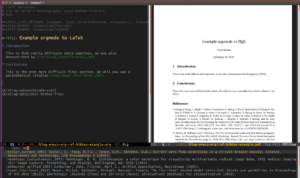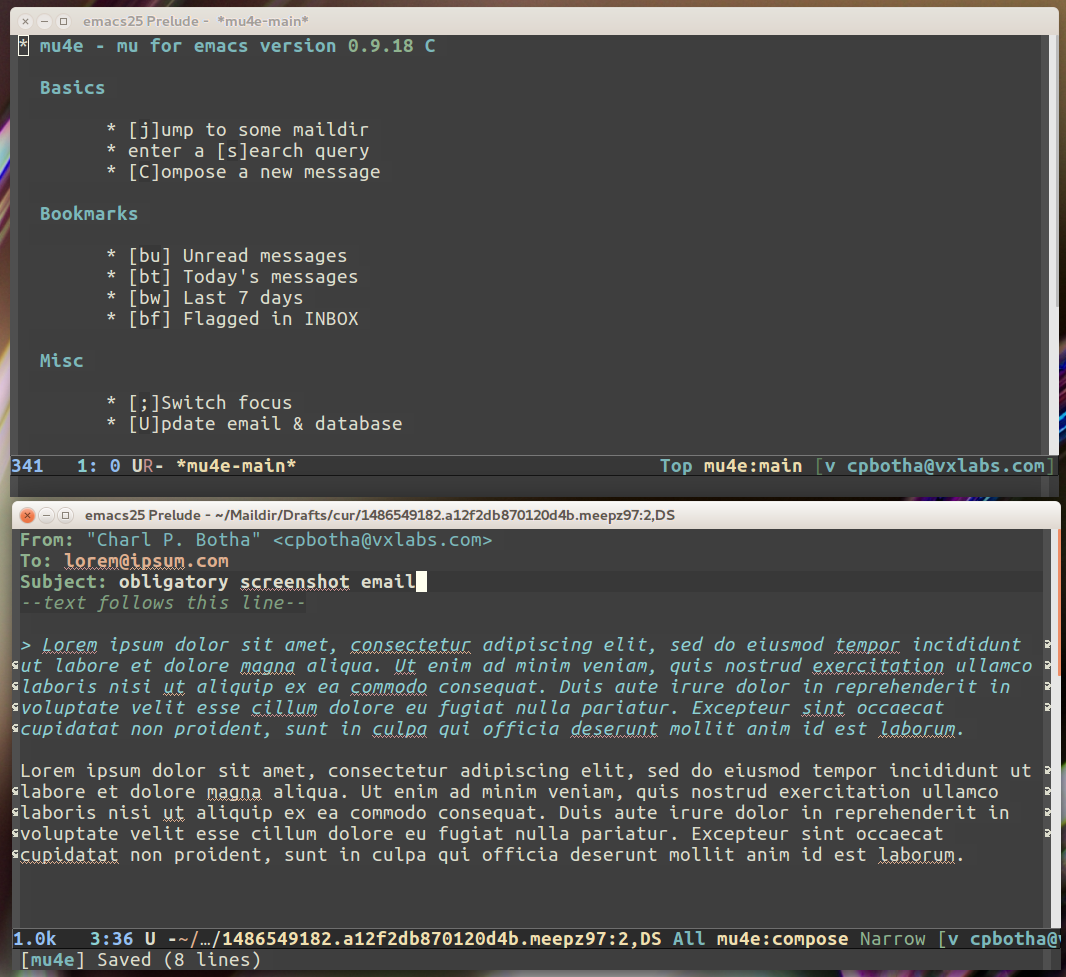Recursive text search in project without projectile
If you’re not using projectile, but you would like to be able to perform interactive, search-as-you-type, recursive searches through the current project, this is pretty easy to do if you have counsel and find-file-in-project installed.
Add the following Emacs Lisp to your init:
(defun cpb/counsel-ag-in-project () "Use `ffip' and `counsel-ag' for quick project-wide text searching." (interactive) (let ((project-root (ffip-project-root))) ;; if ffip could not find project-root, it will already have ;; shown an error message. We only have to check for non-nil. (if project-root (counsel-ag nil project-root nil (format "Search in PRJ %s" project-root)))))(global-set-key (kbd “C-c s”) ‘cpb/counsel-ag-in-project)
From org file with local bibtex to LaTeX and PDF

I have (co-)written a few LaTeX documents in my time.
However, as I have been writing my life and lab notes and many of my technical blog posts in Emacs orgmode for the past few years, I wanted to see how one would go about using BiBTeX references in orgmode files (using John Kitchin’s org-ref package) such that they would render correctly in orgmode’s export LaTeX and PDF.
mu4e 0.9.18: E-Mailing with Emacs now even better.
In this post I talk about three great new features in the latest release of mu4e, an email programme that runs in Emacs. I also show my mu4e configuration as an example to others who would like a similar setup.

After recently discovering that plaintext format=flowed in Thunderbird works only partially, it was time to check back in on mu4e after my previous happy stint using it.
Date-sorted interactive recursive search with ivy, counsel and ag
A core part of my note-taking strategy is a growing collection of Emacs Org mode files containing my monthly lab journals, project summaries and various technical documents.
Usually I rely on Projectile’s Helm integration to perform recursive searches with The Silver Searcher (ag) using helm-projectile-ag (trigged by the completely muscle-memorised C-c p s s) through all of the org files in my notes hierarchy. Recursive regular expression search results are shown interactively as you type. Wonderful!
Step-by-step guide to C++ navigation and completion with Emacs and the Clang-based rtags
If you want C++ completion and navigation (jump to definition, jump to declaration, and so forth), there are several good options for Emacs. For a QtQuick / C++ project I’m working on, I needed the best Emacs has to offer.
This turned out to be the Clang-based rtags system.
Rtags is not the easiest of the options to get going, hence this short tutorial. I initially configured irony-mode, which is also Clang-based and was significantly easier to get going, but it soon started hanging on the completion of for example QStringList methods in my project. Because it also doesn’t support navigation, I decided to try rtags. So far, rtags has been working quite well on a Qt 5.x project of slightly under 200K lines of C++.
Fixing the Cordova browser platform Access-Control-Allow-Origin error
When developing a mobile app using Cordova or PhoneGap, the browser target platform can really speed up your development. You could serve the HTML files directly using cordova serve, but the browser platform, while being almost as fast, is much closer to the Android / IOS environments your app will eventually find itself in. It also has access to the Cordova APIs.
My general workflow is that I keep cordova run browser running in a terminal window (this will initially start a new instance of chrome), and periodically run cordova prepare browser as I’m developing. This last step packages up the “app”, along with the cordova.js bits, for the browser platform.
Up and running with ECL and Emacs SLIME in four easy steps
ECL is of course Embeddable Common Lisp, a small but quite complete Common Lisp implementation that can be easily embedded in your C applications to act as dynamic extension language, but it is also a fine stand-alone implementation. It includes an interpreter and a compiler, and can even produce compact binaries. Read this blog post by Chris Kohlhepp for a brief and practical overview.
SLIME is the Superior Lisp Interaction Mode for Emacs, a great Emacs environment within which one can write code for a number of Common Lisp implementations.
